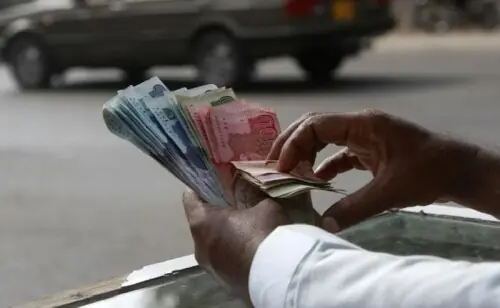ISLAMABAD: Justice Umar Ata Bandial on Tuesday observed that the prime minister, being the head of government with a majority in parliament, has the right to ask about a superior court judge when certain allegations are levelled.
“The prime minister has a constitutional authority and this court respects that authority,” he remarked while hearing a set of challenges against the filing of the presidential reference against Justice Qazi Faez Isa of the Supreme Court.
Justice Bandial, who heads a 10-member larger bench, was of the opinion that if the argument that the PM was nothing or had no role was accepted then how the system would survive. Instead efforts should be aimed at making the system workable, he observed.
Senator Raza Rabbani, representing the Sindh Bar Council, however, said he would not agree with the opinion of Justice Bandial. Under Article 175-A of the Constitution, the bench was apprised, the PM acted as a mere post office in the appointment of the superior court judges, with no other role, as recommendations of the judicial commission and the parliamentary committee went directly to the president for approval.
When the prime minister had no role in judges’ appointment procedure, how could he play a pivotal role in the initiation of a process for the ouster of a judge, Mr Rabbani argued.
Procedure adopted by govt for filing of reference against Justice Isa had misfired, Rabbani tells SC
He elaborated that the rights enjoyed by the prime minister were clearly mentioned in the Constitution and those rights were in respect of the trichotomy of powers. If the prime minister had a role as per opinion of Justice Bandial, it would have provided a lever to the executive for interfering in and manipulating the affairs of the judiciary, Senator Rabbani argued.
When the senator cited the 2010 Iftikhar Mohammad Chaudhry case judgement that came against the reference filed by then president Pervez Musharraf, Justice Bandial said the then president had a clear malice against the then chief justice and in that case the apex court had not touched upon the merits of the case, rather it had taken up only the malice part. In the present reference, however, the Supreme Court had to set certain principles, he observed.
While referring to the arguments that some authorisation was necessary for the opening of the proceedings against the SC judge, Justice Bandial questioned if the executive should put half-baked information before the president to file a reference against a judge in the Supreme Judicial Council (SJC).
Having said that the important thing that should be kept in mind was to make the SJC workable, Justice Bandial said, adding that there should be some system to enable the SJC to proceed instead of blocking its working. In the present case, debates had been going on for the past four months, he remarked.
The basic question, Senator Rabbani reminded the bench, was that the challenges to the filing of the presidential reference were before the Supreme Court bench. He then went on to explain that the present reference against Justice Isa was non est and mala fide in law as well as facts. These were the considerations as the SJC would not go into to evaluate if the filing of the reference was constitutional or not, the counsel added.
He apprised the bench that in the 2010 Iftikhar Chaudhry case, the SC had already held that if the ground was unconstitutional then the entire structure built on it would fall.
Mr Rabbani, while describing it as a bad example, cited the recent Lahore High Court judgement that quashed the entire proceedings of the special court that had convicted Gen Musharraf for high treason on the grounds that the formation of the special court was illegal.
The counsel argued that the accountability of judges should be done strictly in accordance with Article 209 of the Constitution and the initiation of any mode of inquiry against the judges should be under the supervision of the SJC.
When Justice Syed Mansoor Ali Shah asked if it was permissible for the government of the day to snoop around and put in action its entire apparatus to collect information against a judge for the filing of a reference, Senator Rabbani said it was not permissible. He said that snooping around the judge by the Inter-Services Intelligence, Federal Investigation Agency or the Federal Board of Revenue for collection of evidence was entirely illegal.
Referring to the complaint of Abdul Waheed Dogar, the counsel argued that the triggering of the procedure for the filing of the reference had misfired. In fact, he remarked, the government shot itself in the foot by filing the reference. Even if the complainant was considered a genuine person, his one- or two-page complaint should have been transmitted to the president or the SJC, Senator Rabbani argued.
If the SC would arrive at the conclusion that the executive had the power to verify any complaint like that of Mr Dogar, then the net result would be like a parallel operation similar to the National Accountability Bureau (NAB) process, he added.
Asked about maintainability of the petitions after commencement of SJC proceedings, the counsel explained that the council was not a court of law and that its powers and role were defined under Article 209(5)(6) of the Constitution.
The counsel contended that if the president, the prime minister or the executive was allowed to initiate inquiry against the superior court judges, then that inquiry would be unconstitutional and the SC could throw out the reference on the grounds that it was unconstitutional.
Mr Rabbani said the complaint had to be referred to the SJC whenever filed without improving the same through the collection of evidence by the executive.
The counsel is expected to complete his arguments on Wednesday.
Published in Dawn, January 22nd, 2020



































